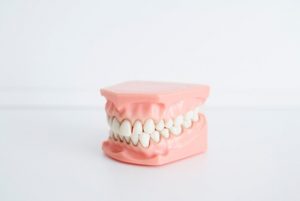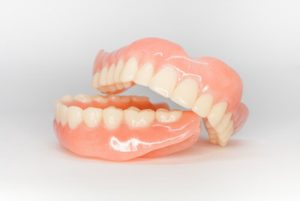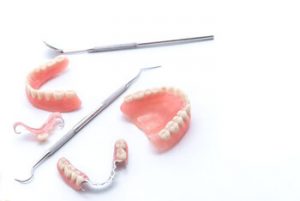Adjusting to life with dentures is a journey, and one of the most common challenges people face is learning how to eat comfortably. For many new denture wearers, the thought of eating favorite foods again feels both exciting and daunting. While it takes some patience and practice, eating with dentures can become second nature over time. This guide will walk you through helpful tips, what to expect during the adjustment period, and how to enjoy meals without unnecessary stress.
 The Adjustment Period: Getting Used to Eating with Dentures
The Adjustment Period: Getting Used to Eating with Dentures
When you first begin wearing dentures, eating may feel very different compared to eating with natural teeth. Your gums, tongue, and mouth need time to adapt. During this initial adjustment period, it is normal to experience sore spots, gum irritation, and occasional difficulty chewing. Most people find that it takes a few weeks to feel confident with their new smile. By starting slowly and choosing manageable pieces of food, you can make the transition smoother.
Start Slowly with Soft Foods
One of the best eating tips for new denture wearers is to begin with soft foods. Options like yogurt, eggs, mashed potatoes, and soft fruits are easier to chew and less likely to irritate your gums. Cooked vegetables, soups, and smoothies also provide nourishment without putting pressure on sore spots. Eating soft foods not only makes chewing easier but also helps you adjust to the way dentures feel when you bite and chew.
Why soft foods matter
Soft foods give your mouth time to adapt to dentures without causing pain. They also reduce the risk of food particles sticking under your dentures, which can cause discomfort. As your mouth heals and you become more comfortable, you can gradually move toward firmer foods.
Chewing Techniques That Make a Difference
When eating with dentures, chewing slowly is key. Cutting food into small pieces makes it easier to manage and reduces the risk of your dentures slipping out of place. Place food on both sides of your mouth simultaneously so the pressure is balanced. This technique helps keep your dentures stable and makes chewing more effective. Over time, these habits become second nature.
Moving on to Firmer Foods
After a few weeks, when you feel more confident and your gums have adjusted, you can introduce firmer foods into your diet. Solid foods such as fish, tender meats, and cooked rice can be added gradually. Remember to continue cutting meals into small pieces and to chew evenly with both sides of your mouth. This steady approach makes it easier to adapt without discomfort.
Foods to approach carefully
Raw vegetables, hard foods like nuts, and sticky foods such as caramel can be tricky for denture wearers. These items may shift your dentures or stick to them, making eating difficult. If you enjoy raw vegetables, try cooking them slightly so they are softer and easier to chew.
Hot and Spicy Foods: Proceed with Caution
Hot foods and spicy foods can sometimes irritate gums, especially for new denture wearers who are still adjusting. Without natural teeth, dentures can make it harder to gauge the temperature of hot foods, which increases the risk of burns. Always test food or drinks before consuming, and avoid overly spicy dishes if your gums feel tender. Over time, many people find they can comfortably enjoy a wide range of flavors again.
Staying Hydrated and Keeping Food from Sticking
Food particles can easily get trapped under dentures, leading to discomfort and sore spots. Drinking water during meals helps wash away food and keeps your mouth feeling fresh. In warm weather, drinking plenty of fluids is especially important, as dry gums can make dentures less stable. A sip of water after each bite can also make swallowing easier and prevent food from sticking.
 Implant-Supported Dentures: A More Stable Option
Implant-Supported Dentures: A More Stable Option
Some people choose implant supported dentures for added stability. These are anchored to dental implants, making eating much easier compared to traditional removable dentures. With implant supported dentures, it is often more comfortable to enjoy firmer foods and feel confident while eating in public. If you find that traditional dentures are difficult to manage, talk to your dentist about whether this option is right for you.
Tips to Avoid Common Problems
- Avoid sticky or hard foods that can dislodge dentures or cause gum irritation.
- Stick to soft fruits and cooked vegetables instead of raw ones during the early stages.
- Cut meals into small pieces to make them easier to chew.
- Practice chewing slowly to allow your tongue and gums to adjust.
- Be careful with hot foods until you are confident about temperature sensitivity.
- If dentures feel a bit sore, give your gums a rest before trying tougher foods.
Building Confidence with Your New Smile
Eating with dentures is not just about nourishment; it is also about enjoying meals and feeling confident around others. It is natural to feel cautious at first, especially when eating in public. The good news is that with patience, practice, and the right eating tips, you will be able to return to enjoying your favorite foods. Many people report that after the initial adjustment, they are pleasantly surprised at how manageable eating becomes.
When to Seek Help from Your Dentist
If you continue to struggle with eating after a few weeks, or if sore spots become worse, it may be a sign that your dentures do not fit properly. A dentist can adjust them to improve comfort and prevent gum irritation. Regular dental visits also help monitor your oral health and ensure your dentures continue to function well.
Final Thoughts: Eating Comfortably with Dentures
 Learning how to eat with dentures takes time, but the process gets easier with patience and practice. Starting with soft foods, chewing slowly, and avoiding sticky or hard foods in the beginning will help make the transition smoother. With gradual adjustments, you will be able to enjoy firmer foods, solid foods, and even your favorite meals again. Remember to drink plenty of water, be careful with hot foods, and check in with your dentist if you experience ongoing discomfort. With the right approach, eating with dentures can become a comfortable and confident part of your daily life.
Learning how to eat with dentures takes time, but the process gets easier with patience and practice. Starting with soft foods, chewing slowly, and avoiding sticky or hard foods in the beginning will help make the transition smoother. With gradual adjustments, you will be able to enjoy firmer foods, solid foods, and even your favorite meals again. Remember to drink plenty of water, be careful with hot foods, and check in with your dentist if you experience ongoing discomfort. With the right approach, eating with dentures can become a comfortable and confident part of your daily life.
References:
https://www.verywellhealth.com/tips-for-eating-with-new-dentures-2507129
https://www.colgate.com/en-us/oral-health/dentures/eating-with-dentures
https://oralb.com/en-us/oral-health/life-stages/adults/eating-speaking-with-dentures
https://www.polident.com/en-ca/expert-advice/living-with-dentures/learning-to-eat-with-dentures/





























